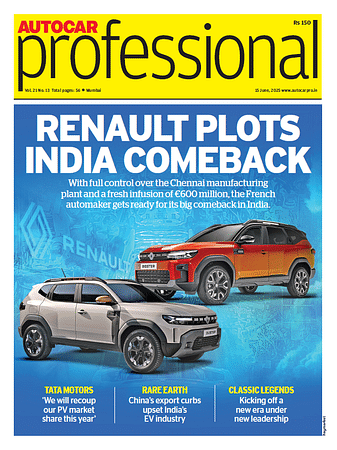FEV India's Sushil Berry & Vijay Sharma: 'We have expanded our BS VI-capable engine test benches to 16 in India.'
FEV India's MD Sushil Berry and technical director Vijay Sharma on participating at SIAT Expo, developing affordable hybrid powertrains, and offering a model-based virtual calibration platform.
FEV India's managing director Sushil Berry and technical director Vijay Sharma speak to Kiran Bajad on participating at SIAT Expo 2019, concept development for OEMs in affordable hybrid powertrains to meet future CAFÉ and emission norms; and offering a model-based virtual calibration platform (VCAP) to drastically reduce the efforts required on engine test bench and on-road calibration.
What is FEV India’s overall theme and focus at SIAT 2019?
FEV’s overall theme is ‘India-specific solutions for future mobility’ for the Indian automotive Industry and on market-fit solutions for BS VI and e-mobility. Our product and services display is in four categories:
Convention Powertrain: FEV 2 Stage Variable Compression Ratio, FEV three-cylinder mock-up, LPG suction tube demo; HECS III (Diesel-Mock-up Motor) demo, and mixer for close-coupled SCR systems.
Connected-Automated-Smart-Electrification (CASE): Battery (Steffi), 48 volt powertrain, 7-speed dual clutch transmission.
Vehicle Engineering: SVEN, the ultimate BEV for future shared mobility.
Testing Solutions: Virtual Calibration (V-CAP) and xCAL testing software demonstration, FEV ASM (Actuator Sensor Modulation) box, in-vehicle RDE assistance, FEV NVH testing facility and vehicle application centre virtual tour.
In the tight run-up to BS VI, Indian OEMs are scouting for greener solutions. What does FEV India have for automakers?
FEV is focusing on improving the emissions performance with the help of improved techniques in areas of aftertreatment calibration (LNT + DPF, DPF + SCR), OBD robustness, thermal management, further improvement of combustion, introduction of direct injection boosting of the engine with downsizing, advancement in aftertreatment systems efficiency for improving tailpipe emissions, friction reduction and various other solutions for conventional IC engines for greener solutions. FEV has also developed advanced calibration software solutions like VCAP and xCAL for improved combustion and efficient filtration of exhaust gases, improving the overall vehicle performance in terms of emission.
FEV India is already working with OEMs and suppliers in offering BS VI solutions in India. What is the progress on this front?
We have added eight more BS VI-capable engine test benches to the existing eight. FEV has also started PEMS measurements for upcoming RDE regulations after 2020. We are closely working with OEMs for BS VI turnkey projects involving complete development of new engine families compliant with BS VI regulations.
FEV is also working on new concept development for OEMs in affordable hybrid powertrains to meet future CAFÉ and emission norms. Being a technical supporting arm to Indian OEMs, we are closely working on the right approach for OEMs towards BS VI development with continuous feedback and brainstorming sessions
What role do you see FEV playing in the Indian automotive industry in the near-term?
FEV offers a comprehensive range of powertrain, vehicle engineering services and testing solutions specific to Indian automotive customers. We offer support in design analysis, simulations, transmission development, calibration and homologation for conventional and alternative fueled powertrains. FEV is also offering a model-based virtual calibration platform (VCAP) to drastically reduce the efforts required on engine test bench and on-road calibration.
Since OBD is mandatory in BS VI applications for two and three-wheelers, passenger cars, commercial vehicles as well as off-road applications, engineering expertise related to OBD calibration and development and robustness, IUPR and IUPV becomes an important aspect during product design and development. FEV has over the years, with European and US customers, developed proven specific engineering methodologies and tools and we bring all these tools, methodologies and expertise to India for BS VI.
We are also supporting industry for development of advanced powertrain, OBD robustness, electronic control system, hybridisation and electrification.
What is FEV India’s growth plan for its India operations?
We are gearing up with facilities and resources to cater to upcoming needs in product development for the Indian market in conventional, hybrid and electrified powertrains. Starting from system / sub-system development and testing capability at the FEV India Technical Center in Pune, FEV is also putting all necessary efforts for relevant fleet testing, RDE validation, IUPV and robustness validation.
We are also setting up a battery test bench, e-Motor, DL test bench and HiL testing for upcoming electrification and hybridisation requirements. We have a strong team of more than 285 engineers and expect to further ramp up headcount to over 500 in the next couple of years.
RELATED ARTICLES
'No Question of Us Being Late' - Suzuki India on e-2Wheeler Market
Suzuki Motorcycle India believes its EV entry is timely as the market is now mature enough to grow off genuine demand ra...
'India Can Become a Major Pillar for Us' - Marquardt Group
Björn Twiehaus, CEO of Marquardt Group, and Vishal Narvekar, the company's India GM, share their outlook on the Indian m...
Luxury Car Market to Slow in 2025: Mercedes-Benz Sees Flattish Numbers
In Jan to March of 2025, the market may witness its slowest growth since COVID-19, and if the weakness continues, the se...





 15 Jan 2019
15 Jan 2019
 37916 Views
37916 Views





 Angitha Suresh
Angitha Suresh


 Darshan Nakhwa
Darshan Nakhwa

 Prerna Lidhoo
Prerna Lidhoo

